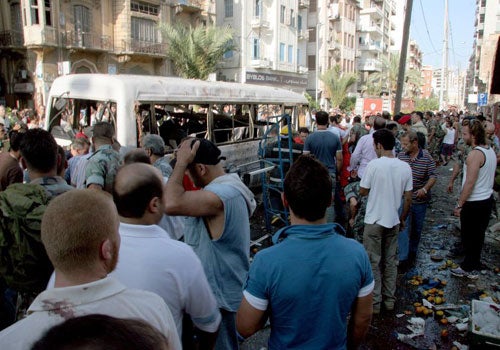Lebanon bus stop bomb kills 18

A bomb killed at least 18 people, including nine soldiers, as they boarded a bus in the northern Lebanese city of Tripoli today, security sources said.
The bomb, which also wounded at least 45 people, was the deadliest attack on the army since its battle with al-Qa'ida-inspired Islamist militants in the north last year.
It had been placed in a bag at a bus stop where soldiers usually gather, the army said in a statement.
Red Cross workers ferried casualties from the site of the blast. The ground was spattered with blood and covered in shards of glass, television pictures showed.
No one claimed responsibility for the attack in Lebanon's second largest city, which has been the scene of fighting between security forces and Islamist militants and sectarian violence linked to the country's political troubles.
President Michel Suleiman, who had been army chief until his election in May, described the bombing as a terrorist attack.
"The army and security forces will not yield to attempts to terrorise them with attacks and crimes," Suleiman said in a statement.
Suleiman led the army during 15 weeks of fighting last year with the al-Qa'ida-inspired Fatah al-Islam group, which was based at a Palestinian refugee camp near Tripoli.
The army lost 170 soldiers while putting down the insurrection at the Nahr al-Bared camp.
Fatah al-Islam, a group which drew fighters from across the Arab world, claimed responsibility for a bomb attack that killed a soldier in north Lebanon in late May.
The Tripoli attack was the latest blow to stability in Lebanon, which has suffered a wave of bombings and political killings since the 2005 assassination of former Prime Minister Rafik al-Hariri.
The list of assassinated figures includes Francois al-Hajj, a senior army officer blown up in December.
"The investigation has begun and there are many interpretations, political interpretations" Information Minister Tareq Mitri said, responding to media speculation that the attack was designed to undermine a visit to Syria by Suleiman.
Suleiman was due to visit Damascus on Wednesday for the first time since his election as president. He is scheduled to meet Syrian President Bashar al-Assad in a visit seen a sign of improved ties between Beirut and Damascus.
Syria had seen the previous US-backed cabinet of Prime Minister Fouad Siniora as hostile and supported an alliance of Lebanese factions led by Hezbollah during 18 months of political conflict with the governing coalition.
The conflict was defused by a Qatari-mediated deal in May. The Doha agreement led to the election of Suleiman and the formation of a national unity government which won a vote of confidence in parliament on Tuesday.
But the rival factions have yet to fully reconcile their differences and at least 22 people have been killed in Tripoli in recent months in sectarian fighting linked to the political troubles.
Join our commenting forum
Join thought-provoking conversations, follow other Independent readers and see their replies
Comments
Bookmark popover
Removed from bookmarks